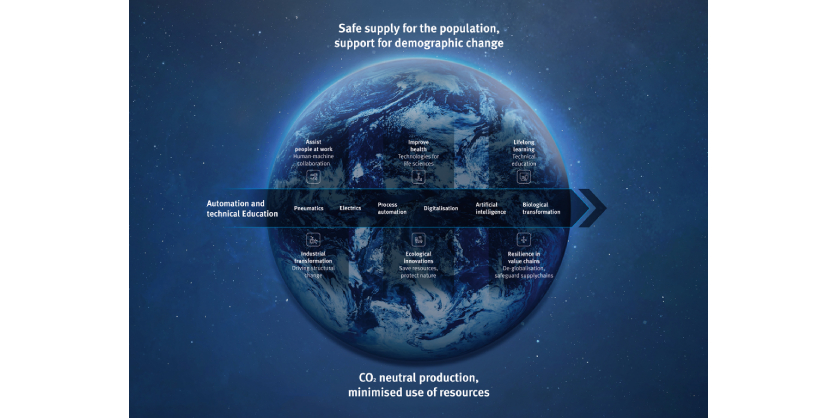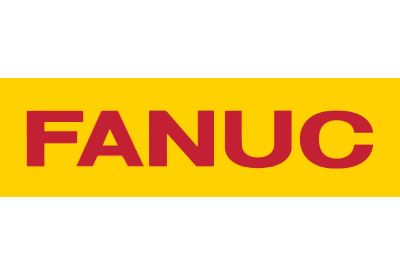Sustainability at Festo – Balanced
Ecological innovations as the key for more sustainability
February 23, 2023

Automation is an enabler for the industrial transformation towards climate protection, resource efficiency and sustainability. With its products and solutions, Festo helps to enable resource-conserving production and helps to establish a circular economy along the entire value chain – with the clear aim of reducing CO2 emissions.
The future of our planet also presents Festo with major challenges. On the one hand, it is about supplying the world’s population and coping with demographic change, and on the other hand, it is about protecting our natural resources and CO2-neutral production. “With our “Blue World” approach, we want to express how we can balance these challenges with the help of Automation Technology and Technical Education,” says Dr. Oliver Jung, Festo CEO.
Festo as the right partner and enabler for more sustainability
With its technology fields of pneumatics, electrical automation, process automation, digitalization and artificial intelligence, Festo enables the transformation of industrial production into an efficient and more climate-friendly way of manufacturing, such as in the field of biotechnology. In addition, Festo provides relief for people in the workplace, supports healthcare with its LifeTech technologies, and enables people to learn and use new technologies efficiently with its learning systems.
Furthermore, Festo supports the structural change of certain industries such as the automotive industry and shows how automation technology can better protect the most important resources of water, earth and air. This also includes shortening transport routes and value chains through increased localization and minimizing emissions in this way.
Change to a circular economy through ecological innovations
Festo sees the next development thrust for industrial production in the shift toward a circular economy. “In nature, there is no waste and no wastage. We just have to learn to transfer these principles to our economies,” says Oliver Jung. Festo’s Bionic Learning Network is therefore conducting research into the automated cultivation of biomass. For example, algae offer great potential and an alternative to petroleum: they bind much more CO2 than land plants and metabolize components through photosynthesis that can be used to produce medicines, cosmetics and bioplastics.
“In 2022, we presented our bioreactor “PhotoBionicCell”, which cultivates algae particularly efficiently through automation technology. At this year’s Hannover Messe, we will show the scaling up of the system and thus the preliminary stage to industrialization. Our customers increasingly perceive us as a technology partner for biological processes. Together with us, they can drive the transformation of industry. Innovations are the key to greater sustainability in this context,” says Oliver Jung.
Dr. Oliver Jung, Festo CEO
That is why Festo has made great progress in important innovations, such as digital and intelligent pneumatics, which, depending on the application, offer significant advantages in energy-efficient use compared to conventional pneumatics. “With our energy-saving products, we are the right partner for our customers for energy-efficient and sustainable production operations. In addition, we enable sustainable industries and technologies with our product and service solutions,” says Christian Österle, Vice President Sustainability at Festo.
CO2 neutrality by 2026
Festo will massively reduce its CO2 footprint in the coming years. “From 2023, all our buildings in Germany as well as our global production and logistics sites will be CO2 neutral with regard to Scope 1 and 2. From 2026, the entire Festo Group will be CO2 neutral. After that, we will continue to work on energy-saving measures and the retrofitting of our heating technology in order to continuously reduce the need for compensation”, says Christian Österle. With the decision to become CO2-neutral, Festo is taking responsibility as a family company.
Christian Österle, Vice President Sustainability at Festo
Lifelong learning as an essential element of sustainable development
As a solution provider for technical education and training, Festo Didactic imparts skills and abilities to master the challenges of the present and shape the future for the benefit of future generations. Festo also attaches great importance to strong training and further education within its own company. In addition, Festo Didactic develops learning content and learning environments for new training professions, based on the increasing requirements in the areas of IT, AI, Data Science or sustainability.
Related Story
Festo Didactic at the Forefront of Developing Canada’s Future Work Force
With Canadian manufacturing suffering from a growing labour shortage, the participation of industry in skills development is emerging as a vital component in hiring and retention. The needs are stark: The Canadian Exporters and Manufacturers Association says almost 40% of its members have jobs they can’t fill. Five years from now, 60% expect to be short-staffed, especially when it comes to skilled trades. Statistics Canada forecasts the country’s labour force growth rate will remain below 0.2% for the rest of the decade, below replacement levels.
In reality, the challenge is two-fold: to replenish and expand the workforce to help close the gap between the number of job seekers and vacancies through 2030 when the last baby boomers reach age 65, and ensure workers get opportunities throughout their careers to upgrade or add to their skillset as current technologies evolve and new ones emerge.
Festo, through Festo Didactic, one of the world leading provider of equipment and solutions for technical education, intends to help Canada meet this challenge on both fronts. In essence, the approach Festo has always taken is that the learning never stops.


